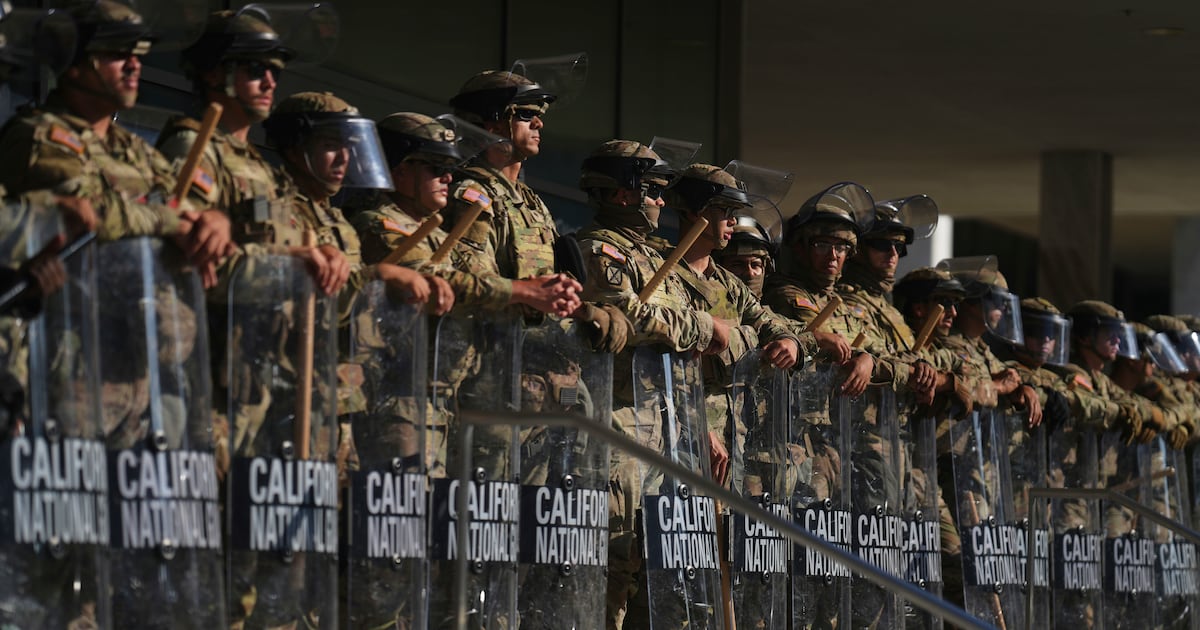In June, President Donald Trump deployed the National Guard to Los Angeles in response to the protests against arrests of migrants living in the country illegally.
Trump decided to call up the National Guard to quell the protests despite California Gov. Gavin Newsom’s pushback. Not only did the governor deem it unnecessary, he accused Trump of escalating the violence.
Was the president right to deploy the troops to California? Half of Utah voters surveyed, or 50%, said they strongly or somewhat approved of Trump’s move in the latest Deseret News/Hinckley Institute of Politics poll conducted by HarrisX.
Another 37% said they strongly or somewhat disapproved, while 12% said they don’t know whether they approve or disapprove of the president’s decision.
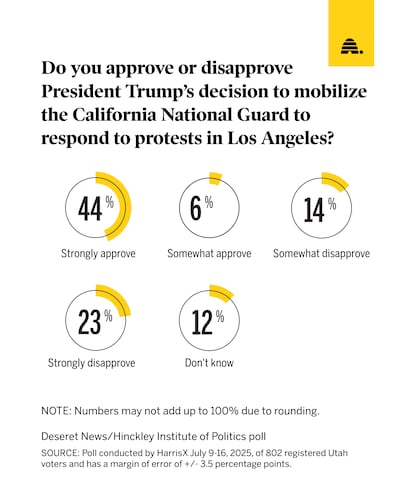 Anna Owens, Deseret News
Anna Owens, Deseret News Jason Perry, director of the Hinckley Institute of Politics, said the response from Utah Republicans isn’t surprising since they also give Trump “high marks on immigration.”
But in a broader sense, these results display the cautious approach Utahns take regarding the federal government’s power to send in the National Guard in response to a protest without approval from the state, said Perry.
“Federalizing the National Guard for protests has been rare in American history, and when it has happened, it has often been remembered as controversial,” he added.
“People may think of the Civil Rights era or the 2020 demonstrations after George Floyd’s death — those events left a lasting impression. Even when voters support a president’s policies, many prefer decisions about public safety to stay with state leaders they know and trust.”
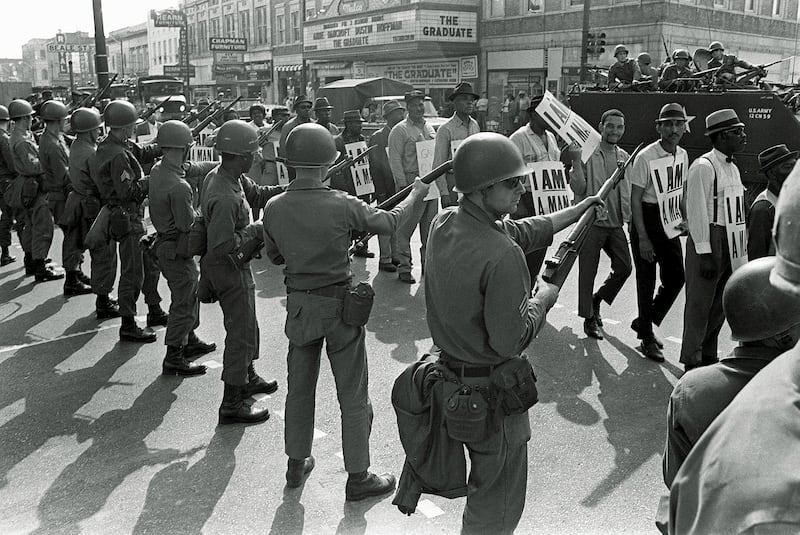 In this March 29, 1968, file photo, striking sanitation workers march past Tennessee National Guard troops with bayonets during a 20-block march to City Hall, one day after a similar march erupted in violence, leaving one person dead and several injured, in Memphis, Tenn. | Charlie Kelly, Associated Press
In this March 29, 1968, file photo, striking sanitation workers march past Tennessee National Guard troops with bayonets during a 20-block march to City Hall, one day after a similar march erupted in violence, leaving one person dead and several injured, in Memphis, Tenn. | Charlie Kelly, Associated Press The poll conducted by HarrisX surveyed 802 registered voters in Utah from July 9 to 16. The margin of error is plus or minus 3.5 percentage points.
Not the first time National Guard deployed without a state’s request
Trump’s decision made headlines, especially since it was the first time in decades that a president sent troops to a state without a governor’s request.
Utah voters were asked whether the president should be able to deploy troops as he saw fit or if he should wait for the green light from the governor.
Three-fifths of respondents, or 58%, supported the president’s authority to do so single-handedly. But 42% of voters said troops should only be mobilized upon a governor’s or mayor’s request.
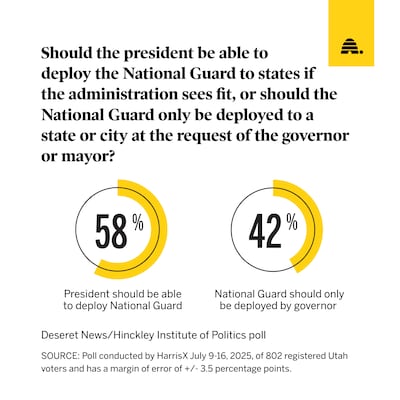 Anna Owens, Deseret News
Anna Owens, Deseret News A large majority of Republicans — 76% — supported a president’s sole authority, while 81% of Democrats said they preferred the president to respond to a request.
“There are many examples in American history of the National Guard assisting during natural disasters, and Utahns are more familiar with those situations, which helps explain the strong support,” Perry noted.
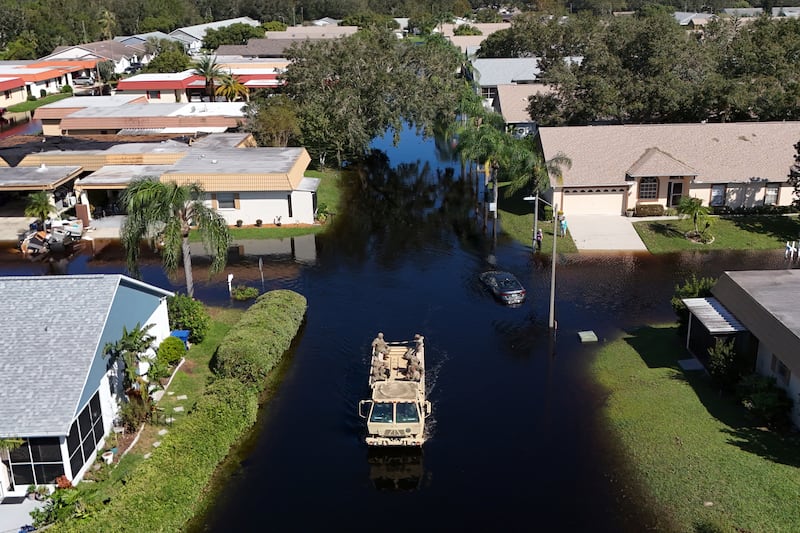 A truck from the Florida National Guard goes out to help residents trapped in their homes as waters rise after Hurricane Milton caused the Anclote River to flood, Friday, Oct. 12, 2024, in New Port Richey, Fla. | Mike Carlson, Associated Press
A truck from the Florida National Guard goes out to help residents trapped in their homes as waters rise after Hurricane Milton caused the Anclote River to flood, Friday, Oct. 12, 2024, in New Port Richey, Fla. | Mike Carlson, Associated Press “It is far less common to see the National Guard involved in riots or protests, and even less common to see it enforcing domestic policies like immigration law. Those actions feel more controversial and political, so public support is naturally more divided,” he said.
In what cases is National Guard deployment acceptable?
The latest Deseret News survey also asked voters in which cases they think the president should be able to mobilize the National Guard without a governor’s approval.
A large majority, about 70%, said it’s permissible during natural disasters. In fact, Democrats (66%) and Republicans (75%) found consensus on this point.
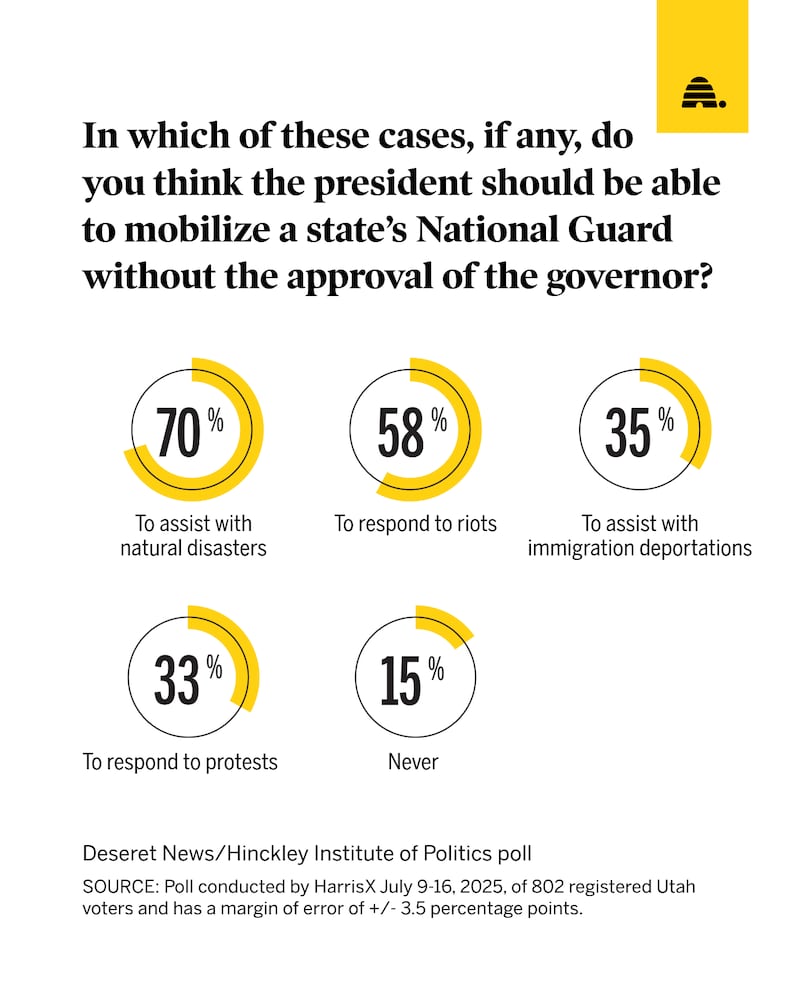 Anna Owens, Deseret News
Anna Owens, Deseret News But the divide between the two sides of the aisle was evident in other cases.
About one-third of voters supported the mobilization to assist with deportations (35%) and respond to protests (33%).
A large chunk of the support comes from Republicans, half of whom support the use of the National Guard for aiding in deportations and clamping down on protests. Meanwhile, roughly 12% of Democrats and 22% of independents think the same.
And roughly 58% of voters said they think the move is an appropriate response to riots.
Diving deeper, approximately 75% of Republicans and 46% of independents agreed with the use of troops in this instance, regardless of the state’s approval. Only 26% of Democrats concurred.
“Party identity plays a role, but so does the information people consume,” Perry said. “Many conservatives watched coverage that emphasized violence or unrest, which made the response seem necessary. Others saw coverage highlighting peaceful demonstrations, which led to more opposition.”
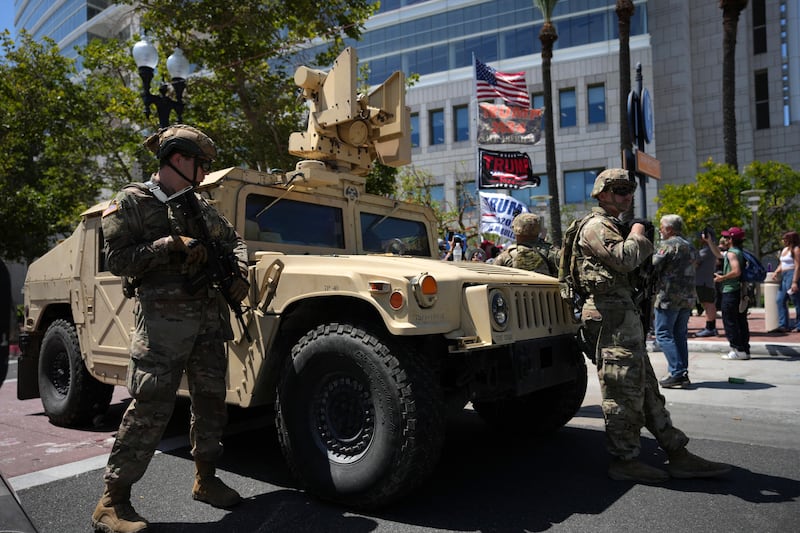 California National Guard stand guard along a street near protesters and Trump supporters in Santa Ana, Calif. on Tuesday, June 10, 2025. | Jae C. Hong, Associated Press
California National Guard stand guard along a street near protesters and Trump supporters in Santa Ana, Calif. on Tuesday, June 10, 2025. | Jae C. Hong, Associated Press 